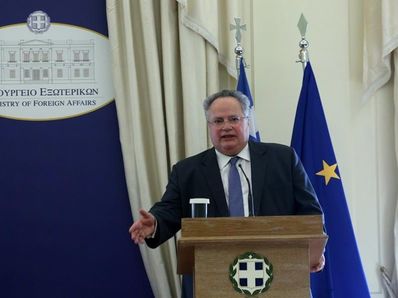 Nikos Kotzias, Minister of Foreign Affairs
Nikos Kotzias, Minister of Foreign Affairs of the Hellenic Republic | Photo credit: Ekathimerini
Athens hopes to get the ball rolling in a new United Nations-mediated push to resolve a longstanding dispute with the Former Yugoslav Republic of Macedonia over the latter’s name, with Foreign Minister Nikos Kotzias to receive FYROM’s deputy premier for European Affairs Bujar Osmani on Tuesday.
The meeting comes ahead of a scheduled summit of Greek and FYROM diplomats in New York on January 19 when UN special mediator Matthew Nimetz is expected to present a proposal for a solution to the decades-old spat. If that meeting goes well, the next step would be talks between Prime Minister Alexis Tsipras and his FYROM counterpart, Zoran Zaev.
There are several hurdles to overcome first, however, even though both sides have expressed their desire to reach a solution. An internal rift within the Greek government over the matter, due chiefly to a differentiation of stance by junior coalition partner leader Panos Kammenos, appears to be healing.
Another concern is about the possibility of both sides calling referendums on a solution. According to sources, Kotzias told officials in FYROM that if they fulfill pre-election promises to hold a referendum then Greece would be obliged to do the same, which would produce a deadlock.
There is much speculation about what solution Nimetz will propose next week though it is considered likely that it will be a composite name with some sort of geographical determinant.
Government sources in Athens have indicated that, should the name proposed form a basis for negotiation, then Tsipras and Zaev could continue discussions when they meet in Davos, Switzerland, on January 24 for the World Economic Forum.
Commenting in an interview with state television on Saturday, government spokesman Dimitris Tzanakopoulos said Greece was hoping for the broadest possible domestic consensus for a solution, referring to a “window of opportunity” to solve a problem that has been pending for 25 years.
In an interview with Kathimerini’s Sunday edition, Thessaloniki Mayor Yannis Boutaris said Zaev had expressed his determination to solve the dispute during a recent dinner in the northern port.
Responding to reports that residents of Thessaloniki are planning protests due to fears that Athens will compromise too much in the name talks, Boutaris said he would publicly condemn them. Protests in 1992 over the same issue were “distasteful initiatives that should not be repeated,” he said.
Source: Ekathimerini
The meeting comes ahead of a scheduled summit of Greek and FYROM diplomats in New York on January 19 when UN special mediator Matthew Nimetz is expected to present a proposal for a solution to the decades-old spat. If that meeting goes well, the next step would be talks between Prime Minister Alexis Tsipras and his FYROM counterpart, Zoran Zaev.
There are several hurdles to overcome first, however, even though both sides have expressed their desire to reach a solution. An internal rift within the Greek government over the matter, due chiefly to a differentiation of stance by junior coalition partner leader Panos Kammenos, appears to be healing.
Another concern is about the possibility of both sides calling referendums on a solution. According to sources, Kotzias told officials in FYROM that if they fulfill pre-election promises to hold a referendum then Greece would be obliged to do the same, which would produce a deadlock.
There is much speculation about what solution Nimetz will propose next week though it is considered likely that it will be a composite name with some sort of geographical determinant.
Government sources in Athens have indicated that, should the name proposed form a basis for negotiation, then Tsipras and Zaev could continue discussions when they meet in Davos, Switzerland, on January 24 for the World Economic Forum.
Commenting in an interview with state television on Saturday, government spokesman Dimitris Tzanakopoulos said Greece was hoping for the broadest possible domestic consensus for a solution, referring to a “window of opportunity” to solve a problem that has been pending for 25 years.
In an interview with Kathimerini’s Sunday edition, Thessaloniki Mayor Yannis Boutaris said Zaev had expressed his determination to solve the dispute during a recent dinner in the northern port.
Responding to reports that residents of Thessaloniki are planning protests due to fears that Athens will compromise too much in the name talks, Boutaris said he would publicly condemn them. Protests in 1992 over the same issue were “distasteful initiatives that should not be repeated,” he said.
Source: Ekathimerini




 RSS Feed
RSS Feed